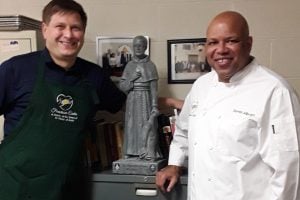
Elevated Soups was founded by Jeff Griffin, executive director and Chef Steven Allbright, culinary director, of the Franciscan Center of Baltimore.
Tell us about your business.
The Franciscan Center of Baltimore began its mission in Baltimore in 1891 when the Franciscan Sisters of Baltimore fed the hungry and cared for orphans. Throughout our history, our priority has been to recognize the dignity of each human being and serve all people with respect. We now offer a continuum of care that includes food, clothing, emergency health services, counseling and technology training to help clients become as self-sufficient as possible.
Speaking specifically of our culinary services, on a typical day, we feed 400–600 people who visit our center to enjoy a healthy prepared meal created from fresh ingredients. Now, we are trying to change the clichéd image of a soup kitchen — someone standing outside with soup and crusty bread. We want to elevate the discussion of what a soup kitchen can be in the 21st century to break the generational cycle of poverty. That’s why we are launching a community culinary school this month and plan to launch the Elevated Soups brand in the fall. Elevated Soups aims to lift your spirit and aligns with the Franciscan Center’s goal of sharing hope and dignity for all people.
Why did you decide to start Elevated Soups? Where did the idea come from?
The concept of a culinary school and social enterprise attached to a soup kitchen is not new. We have seen this work with models like DC Central Kitchen or Light House in Annapolis, where our chef, Steven Allbright, previously worked.
The Franciscan Center was looking for another revenue source to get the word out about our mission and impact. Launching Elevated Soups provides a different way of attracting diverse donors and marketing our services.
In addition to everything fresh, we have also changed the perception of how we feed others. We train staff and volunteers how to set out the plates in an appealing manner. We all eat with our eyes, so why not create the same opportunity for our clients? We want to treat those across the counter with dignity and respect.
What have you accomplished so far?
The culinary school’s first class started this week with about a half-dozen students.
For Elevated Soups, we have interviewed nearly 40 prospective buyers and learned buying habits as well as packing ideas. We are now developing a business plan to help us project and plan for the next three years of the company.
How can people supporting you in your venture?
We need help telling our story through our website and social media, as well as through social events and gatherings once COVID-19 is more behind us.
We need help developing packaging and promotional items, and we would like to speak with nutritional experts.
We are also looking for investors to help us launch this company through strategic events, stores, farmers markets and online sales.
What have been some of the biggest challenges in scaling your venture during the pandemic?
Our first mission during COVID-19 was doing everything we could to keep our staff safe and healthy so we could stay open and continue creating healthy meals for our clients. Amid the pandemic, the need for our meals increased drastically, followed by the need to provide pantry items, hygiene items, clothing and many other services.
In 2019, we served 131,000 meals. In 2020, by comparison, we provided 347,000 meals to mostly neighbors and partners in Baltimore but also to organizations in six other counties in Maryland.
Trying to take on Elevated Soups during the pandemic has been tough because we had so many different challenges and opportunities to help people. We quickly learned to juggle projects and priorities daily. It was difficult to focus on the long-term future when our future was two days away.
What advice do you have for would-be social entrepreneurs thinking about starting a venture?
Really think about what you want to accomplish. Is there another organization that is doing the same work that could use your passion?
If you determine that other organizations are not addressing your concerns or ideas, then jump in. If you don’t, you will always be reminded of what you didn’t try.
What attracted you to the Social Innovation Lab?
Johns Hopkins is an organization that has a reputation for excellence worldwide. We knew Johns Hopkins and SIL could provide the network and education we needed to make our idea grow.
Read more about Elevated Soups here. To learn more about the Social Innovation Lab and the 2020-21 cohort, click here. Join them at our virtual SIL Innovators’ Showcase event, 4-6 p.m. on April 27.